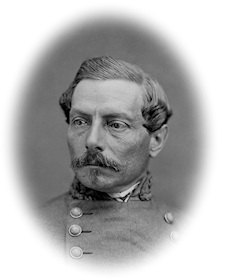HEADQUARTERS PROVISIONAL ARMY, C. S. A.,
Charleston, S.C., April 16, 1861.
SIR: I have the honor to submit the following summary statement of the circumstances of the surrender of Fort Sumter: —
On the refusal of Major Anderson to engage, in compliance with my demand, to designate the time when he would evacuate Fort Sumter, and to agree meanwhile not to use his guns against us, at 3.20 o’clock in the morning of the 12th instant I gave him formal notice that within one hour my batteries would open on him. In consequence of some circumstance of delay the bombardment was not begun precisely at the appointed moment, but at 4.30 o’clock the signal gun was fired, and within twenty minutes all our batteries were in full play. There was no response from Fort Sumter until about 7 o’clock, when the first shot from the enemy was discharged against our batteries on Cummings Point.
By 8 o’clock the action became general, and throughout the day was maintained with spirit on both sides our guns were served with skill and energy. The effect was visible in the impressions made on the walls of Fort Sumter. From our mortar batteries shells were thrown with such precision and rapidity that it soon became impossible for the enemy to employ his guns en barbette, of which several were dismounted. The engagement was continued without any circumstance of special note until nightfall, before which time the fire from Sumter had evidently slackened. Operations on our side were sustained throughout the night, provoking, however, only a feeble response.
On the morning of the 13th the action was prosecuted with renewed vigor, and about 7 ½ o’clock it was discovered our shells had set fire to the barracks in the fort. Speedily volumes of smoke indicated an extensive conflagration, and apprehending some terrible calamity to the garrison I immediately dispatched an offer of assistance to Major Anderson, which, however, with grateful acknowledgments, he declined. Meanwhile, being informed about 2 o’clock that a white flag was displayed from Sumter I dispatched two of my aides to Major Anderson with terms of evacuation. In recognition of the gallantry exhibited by the garrison I cheerfully agreed that on surrendering the fort the commanding officer might salute his flag.
By 8 o’clock the terms of evacuation were definitely accepted. Major Anderson having expressed a desire to communicate with the United States vessels lying off the harbor, with a view to arrange for the transportation of his command to some port in the United States, one of his officers, accompanied by Captain Hartstene and three of my aides, was permitted to visit the officer in command of the squadron to make provision for that object. Because of an unavoidable delay the formal transfer of the fort to our possession did not take place until 4 o’clock in the afternoon of the 14th instant. At that hour, the place having been evacuated by the United States garrison, our troops occupied it, and the Confederate flag was hoisted on the ramparts of Sumter with a salute from the various batteries.
The steamer Isabel having been placed at the service of Major Anderson, he and his command were transferred to the United States vessels off the harbor.
The urgency of immediate engagements prevents me from giving at present a more circumstantial narrative of the incidents connected with the capture of Fort Sumter. When the reports from the various commanders of batteries are received I will hasten to forward you a more detailed account.
In conclusion, I am happy to state that the troops, both officers and soldiers, of the Regulars, Volunteers, Militia, and Navy, by their energy, zeal, perseverance, labor, and endurance before the attack, and by their courage and gallantry during its continuance, exhibited all the characteristics of the best troops; and to my staff, Regular and Volunteer, I am much indebted for the prompt and complete execution of my orders, which had to be communicated in open boats during the bombardment to the different batteries then engaged.
I remain, sir, very respectfully, your obedient servant,
G. T. BEAUREGARD,
Brigadier-General, Commanding.
Hon. L. P. WALKER,
Secretary of War, Montgomery, Ala.
